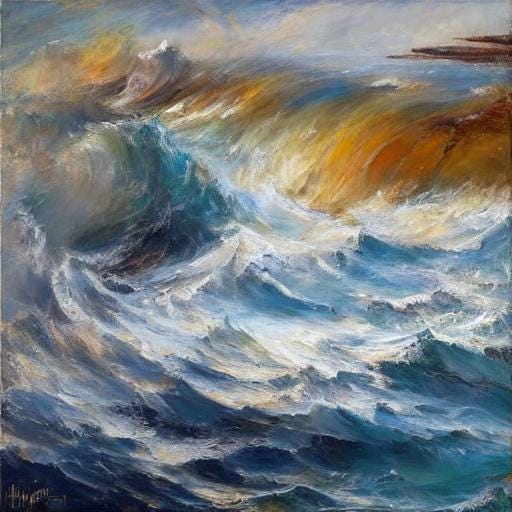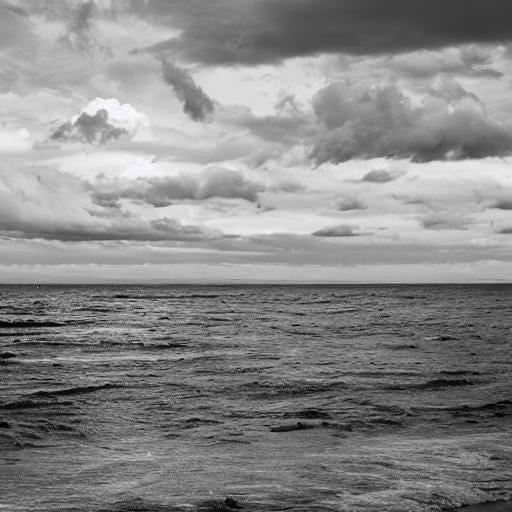The Drama Fallacy
only in hindsight, never foresight
I
Everything becomes clear in hindsight. Always in hindsight. Only in hindsight, but somehow nobody ever has the foresight.
“We should have seen it coming.”
“Nobody could know that could happen.”
“Our models could not have predicted it.”
bla bla bla
II
The world is inherently uncertain; we do not know what's going to happen and we cannot predict when something will happen. Take death, for example—inevitable yet unpredictable. We do not know when. But we know it’s bound to happen.
Despite this, we have life insurance policies. We take out a policy in case anything happens. We rely on actuaries to calculate odds based on quantifiable variables.
We can to some extent, protect ourselves from danger. Or at least prepare ourselves for the worst. Or so it seems.
III
There’s two stories about climbers on Mount Everest in Annie Duke’s book Quit.
In the first story, the climbers head up Everest after months of preparation and acclimitising to the mountain. It was agreed that the rule was they turn back by 1pm, regardless of how close they are to the summit. Because the descent down the mountain is perilous in the dark. Temperatures drop fast too.
This first group of climbers went up the mountain and sure enough by 1pm they decided to climb back down. No glory to be had but they lived.
In the second story, these climbers headed up the mountain and reached the summit by 2pm. An impressive achievement. Most in the group saw it was getting dark and promptly headed back down. But one waited for a fellow climber and both only began their descent after 4pm. Both died.
In hindsight, those deaths were largely preventable. The 1pm rule was in place for a reason. Whatever glory they had in accomplishing that feat was shortlived. A tragedy really.
IV
There’s plenty of reasons why we make bad decisions. For one, our decision’s marred by subconcious biases like the sunk-cost fallacy, the endowment effect, and most insidious of all — our ego.
There’s also external constraints such as contractual obligations, and our reputation’s at stake. Thereby reinforcing the psychological fallacies too.
These factors lead to short-sightedness, blinding us to the long-term consequences of our actions.
V
Our brains are wired for stories, for drama. We find narratives far more digestible than dry facts and mere data. Take for example the narrative fallacy — popularized by Nassim Taleb — we see events as stories with a clear chain of cause-and-effect. Stories provide us with a sense of coherence and help us make sense of the world.
But I feel that our fondness for stories leads us to let bad things happen. As though we need a narrative of struggle and triumph. We embrace suffering and crises because they provide a compelling story — a cause for glory. Tragedy begets martyrs.
In contrast, prevention leads to… nothing. We avoided an illness, regulators avoided triggering an economic collapse. Everyone carries on their day. No tales of triumph over great trials. Just another day. No story, no glory.
In the Black Swan, Nassim Taleb writes (edited for brevity and clarity):
We remember the martyrs who died for a cause that we knew about, never those no less effective in their contribution but whose cause we were never aware of —precisely because they were successful.
Assume that a legislator with courage, influence, intellect, vision, and perseverance manages to enact a law that goes into universal effect and employment on September 10, 2001; it imposes the continuously locked bulletproof doors in every cockpit (at high costs to the struggling airlines)—just in case terrorists decide to use planes to attack the World Trade Center in New York City.
The legislation is not a popular measure among the airline personnel, as it complicates their lives. But it would certainly have prevented 9/11. The person who imposed locks on cockpit doors gets no statues in public squares, not so much as a quick mention of his contribution in his obituary.
Seeing how superfluous his measure was, and how it squandered resources, the public, with great help from airline pilots, might well boot him out of office. He will retire depressed, with a great sense of failure. He will die with the impression of having done nothing useful.
Now consider again the events of 9/11. In their aftermath, who got the recognition? Those you saw in the media, on television performing heroic acts, and those whom you saw trying to give you the impression that they were performing heroic acts.
Who gets rewarded, the central banker who avoids a recession or the one who comes to “correct” his predecessors’ faults and happens to be there during some economic recovery? Who is more valuable, the politician who avoids a war or the one who starts a new one (and is lucky enough to win)?
It seems that we're addicted to the drama of hindsight, even if it means sacrificing our foresight.
VI
The world is uncertain. Life will have its own pitfalls and dangers. There will be moments of triumph and torment in our lives.
So, why make our lives even more difficult?
Why chase the drama for some heady feeling of glory, as fleeting as it is?
Sure, we all want stories to tell, a life filled with crises that we heroically overcome. But what if the true victory lies in preventing the crises that may never be told, yet have the power to shape a better world?
Read
Chaos Kings: How Wall Street Traders Make Billions in the New Age of Crisis
by Scott Patterson
First off, wow. What a book. It’s bit part a brief biography of key figures such as Mark Spitznagel, and Nassim Taleb. It’s also an exploration of people who live in the world of risks and uncertainty - the Chaos Kings.
The chaos kings are traders, quants, scientists and scholars of all kinds have sought to understand, manage and harness risks to their advantage. Traders look to shield themselves from uncertainty while also exploiting it for profit. Thinkers have sought to understand, predict or even mitigate risks and complexity.
The book ultimately tells a lesson about how the world was always uncertain, even more so now because of the complexity of our very connected world, that we should be wiser and much humbler when faced with such a chaotic world.
Watch
Sanshiro Sugata
directed by Akira Kurosawa
Sanshiro Sugata was director Kurosawa’s first feature. It is a fictionalised account of Shiro Saigo, an early disciple of Judo. The film has some textbook Judo throws and features plenty of cinematic techniques that forms Kurosawa’s signature. The film, being his production, feels narratively unpolished and does not engage the attention as well his latter films. But I guess that even the Greats have to start somewhere.
The Tim Ferriss Show - Nassim Nicholas Taleb and Scott Patterson
As a companion piece to the book, Chaos Kings, this podcast episode’s pretty fun and relaxed. Taleb drops the occasional aphorism like:
“Some are just contrarian because they have a father problem.”
🤣
Listen
Find me on twitter @ RaketheGates




I'll have to check out Kurosawa's first work! There's an academic article floating around the internet about how Sanshiro's satori changed from the book to the movie as the Japanese view of self, state, and war changed (his realization initially had something to do with purpose in serving others, although I never actually watched the film so I'm not sure).
You can find it here: https://www.academia.edu/3617301/Sugata_Sanshiro_s_Satori
Thought it was relevant to your post as it was a shift in hindsight.